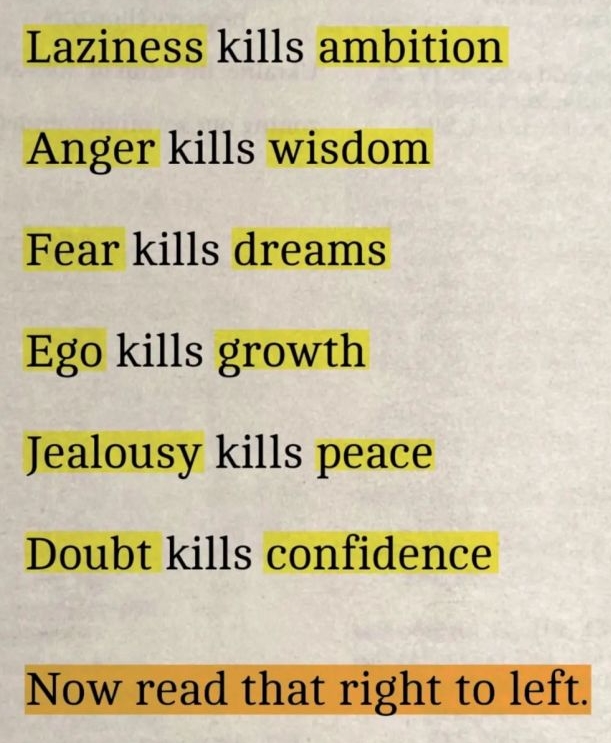Stop Negative Thoughts
April 27, 2025Pastor Patrick presented today's message, "Stop Negative Thoughts." A video of today's message is here on YouTube.
TimberCreek Church Announcement: In a few weeks, TimberCreek will start a sermon series entitled "You Asked For It." The title is literal. You can ask for specific scripture verses to be explored/explained. To submit a verse to be considered for this series, use this form.
Now, back to our regularly scheduled programming...
The following verses all directly apply to today's message.
Proverbs 4:23: "Above all else, guard your heart, for everything you do flows from it."
Proverbs 3:5-6: "Trust in the Lord with all your heart and lean not on your own understanding; in all your ways submit to him, and he will make your paths straight."
Psalm 51:10, "Create in me a pure heart, O God, and renew a steadfast spirit within me."
Psalm 19:14: "May the words of my mouth and the meditations of my heart be pleasing in your sight, Lord, my Rock and my Redeemer." My Dad would often start his sermons with these words as a prayer.
Were you thinking "brain" whenever you read "heart" in the verses above? You should have been. It would have given you a better understanding of what was meant. This is because back in the time (Ancient Near East, ANE) when those words were written, the word translated as "heart" (lay-bawb', לֵבָב) was understood to be the seat of not only emotions, but meant also the seat of will, thinking, character, and the like. It was all of one's "inner life." It's what we understand as the brain today. We know that the brain is the center of thoughts, emotions, feelings, self, intentions, decision-making, etc. The heart pumps blood, period, end of story, that's it.
God made it abundantly clear, right from the beginning, that man left alone would have bad thoughts. Genesis 8:21b, "Never again will I [God] curse the ground because of humans, even though every inclination of the human heart is evil from childhood." This is what Patrick referred to as "letting human nature take over." We absolutely need God to affect our thinking.
Deuteronomy 28 makes it clear what will happen if you truly let God in: all God's blessings will come upon us if we listen to and obey the voice of the Lord our God. That means we must align ourselves with the will of God to be blessed by God. One of those blessings can be positive thinking.
Here's an interesting take on Bible-based positive thinking. It starts like this: "Positive thinking, in many modern contexts, is commonly understood as maintaining an optimistic outlook, expecting good outcomes in life, and encouraging oneself or others through encouraging thoughts and words. Within the biblical framework, such a concept transcends mere human optimism. Scripture places ultimate hope and confidence in the character and promises of God rather than in personal willpower or blind optimism." Read the entire article, BibleHub.com: Bible's view on positive thinking?
Bonus
My Dad Always Told Me..., or
Walking with God
 Our parents had much to teach us. In a bigger sense, our forefathers have much to teach us. Same was true of Jesus and his familial ancestors. Jesus taught in large part from the Hebrew scriptures (the Jewish Old Testament). This was, in essence, the advice and instruction that God, Jesus' Father, gave to Jesus' forefathers.
Our parents had much to teach us. In a bigger sense, our forefathers have much to teach us. Same was true of Jesus and his familial ancestors. Jesus taught in large part from the Hebrew scriptures (the Jewish Old Testament). This was, in essence, the advice and instruction that God, Jesus' Father, gave to Jesus' forefathers.
TheTrumpet.com
How to Walk with God from TheTrumpet.com.
Here some other thoughts on what it means to walk with God...
From Steven Cole: "Someone has said that we tend to think of commitment to Christ like laying a $1,000 bill on the table: 'Here’s my life, Lord. I'm giving it all.' But the reality is that God sends most of us to the bank and has us cash in the $1,000 for quarters. We go through life putting out 25 cents here and 50 cents there, in small deeds of faithfulness and obedience. But it's right there, in those little 25 cent choices, that our lives take their direction."
"So make your choices based on God's principles: Relationships over rights; godliness over greed; fellowship with God over the world’s approval; and, faith in God's promises over immediate pleasure from the world. Because if you have God and His promises, you have everything. So seek Him first, and all else is yours."
The Disciple Digest offers these thoughts from Abraham's story:
1. Faith requires trust in God's promises.
2. Faith involves obedience, even when it's hard.
3. Faith is a journey, not a destination.
4. Faith brings blessings beyond yourself.
It's clear that walking is key. It's active. Your relationship with God must be active. It's not sitting or standing or contemplating.
It's interesting that many books and articles about faith, including and maybe specifically walking with God, use the story of Abraham to make their points. The references start with Abram leaving all he knew and had to follow and comply with God's call. Abraham's story continues with tales of obedience, resilience, perseverance, and bravery into the unknown.
If you do a search on "walk with God" you'll find many references to Enoch. If you know that name from Genesis at all, it's either because of the "walked with God" reference (Genesis 5:24) or because he was the father of the oldest man in the Bible, Methuselah. ChristianStudyLibrary.org's article, "Genesis 5 - Enoch: The Man Who Walked with God," talks about these key points:
Trust in God
Communion with God
Obedience to God
Enoch's Reward
The Old Testament word used in expressions like "walk with God" is hah-lahk (הָלַך). It's used over 1500 times in the OT and has many words used to translate it. Here's what Strong's Lexicon says: "Usage: The Hebrew verb "halak" primarily means "to walk" or "to go." It is used extensively throughout the Old Testament to describe physical movement from one place to another. Beyond its literal sense, "halak" is often employed metaphorically to describe one's conduct or way of life, indicating a manner of living or behaving in accordance with God's commandments or moral principles. Cultural and Historical Background: In ancient Hebrew culture, walking was the primary mode of transportation and a common daily activity. The concept of "walking" was deeply embedded in the Hebrew mindset, symbolizing one's journey through life and one's relationship with God. Walking in the ways of the Lord was a central theme in the Hebrew Scriptures, reflecting obedience, faithfulness, and a righteous lifestyle."
Grab hold tightly of your Father's hand and carry on.
Bonus2
Notes from Nana
Nana recently started a "reach the kids where they are" sort of thing by using a text group to pass on daily inspirational, and teaching, thoughts that she picks out. Here are some of the latest entries:
"Always do what you're afraid to do" - Ralph Waldo Emerson. Nana added, "This isn't just a quote. It's a challenge. Fear shows us the way. What scares you might be the thing that grows you. Speak when your voice shakes. Try when you feel small. That's how you build courage. That's how you grow. Don't wait to feel ready. Do the hard thing now. Emerson said it best — do what you are afraid to do."
No one has all the answers. But together, we get closer. The wisdom of the group beats a single mind every time. "None of us is as smart as all of us." Chinese proverb.
Then there's this gem:

Bonus3
Think Wisdom, not Law
 It may be more helpful to think of the Books of the Law (a common reference to the first five books of the Old Testament) as Books of Wisdom instead. Similarly, it may be more helpful to think in terms of consequences rather than punishments.
It may be more helpful to think of the Books of the Law (a common reference to the first five books of the Old Testament) as Books of Wisdom instead. Similarly, it may be more helpful to think in terms of consequences rather than punishments.These Books of Wisdom provide answers to all manner of issues that can arise in personal lives, the lives of families, the lives of neighbors and friends - all the way up to civilization itself. Think of them as suggestions rather than answers if that makes it easier for you to consider them.
Wisdom is a key to success.
"The Lord... visits the iniquity of the fathers on the children and the children's children, to the third and the fourth generation." (Exodus 34:6-7 and Deuteronomy 5:8-10). Some translations say the Lord punishes the subsequent generations. Instead, try thinking of consequences - natural consequences. If the father is a bad guy, odds are good the children will have issues, too. You can't be a bad father and not expect that fact to affect your kids. It's a natural consequence. The good news is that if you're a good father, the goodness will also be passed down or "absorbed" by your kids and grandkids. And even better, God says that the goodness will last for 1,000 generations.
And doesn't our experience tell us that this is true. We often see kids inherit traits and behaviors from their parents, whether good or bad. For example, we often give the benefit of the doubt to kids of good parents and not so much to kids of bad parents. "I knew your father, he was a good man; I'll give you a try." It's a matter of natural consequences.
I say this knowing full well that bad things happen to good people and vice versa. In a way, life is a crap shoot. But you can push the odds in your favor by being wise. The first five books of the Old Testament are the best source of wisdom ever written (not to suggest there isn't other great wisdom elsewhere in the OT, like Proverbs). [IMHO]
 The Hebrew word torah (תּוֹרָה) is never used in the Bible to mean the first five books. It is used a great deal, however, in the translations to mean instruct, law, rule, and teach. It's interesting to note that the original use of the root means "to shoot or guide straight," often in the sense of teaching. Here's the Strong Lexicon entry: "Usage: The term "Torah" primarily refers to the first five books of the Bible, also known as the Pentateuch. It encompasses the laws, commandments, and teachings given by God to the people of Israel through Moses. In a broader sense, "Torah" can refer to the entire body of Jewish religious teachings, including both written and oral traditions. It is often translated as "law" but carries a deeper connotation of divine instruction and guidance for living a life pleasing to God. Cultural and Historical Background: In ancient Israel, the Torah was central to religious, social, and legal life. It was considered the ultimate authority and guide for moral conduct, worship, and community governance. The Torah was read publicly and taught in synagogues, ensuring that its teachings were accessible to all. The giving of the Torah at Mount Sinai is a foundational event in Jewish history, symbolizing the covenant between God and His people."
The Hebrew word torah (תּוֹרָה) is never used in the Bible to mean the first five books. It is used a great deal, however, in the translations to mean instruct, law, rule, and teach. It's interesting to note that the original use of the root means "to shoot or guide straight," often in the sense of teaching. Here's the Strong Lexicon entry: "Usage: The term "Torah" primarily refers to the first five books of the Bible, also known as the Pentateuch. It encompasses the laws, commandments, and teachings given by God to the people of Israel through Moses. In a broader sense, "Torah" can refer to the entire body of Jewish religious teachings, including both written and oral traditions. It is often translated as "law" but carries a deeper connotation of divine instruction and guidance for living a life pleasing to God. Cultural and Historical Background: In ancient Israel, the Torah was central to religious, social, and legal life. It was considered the ultimate authority and guide for moral conduct, worship, and community governance. The Torah was read publicly and taught in synagogues, ensuring that its teachings were accessible to all. The giving of the Torah at Mount Sinai is a foundational event in Jewish history, symbolizing the covenant between God and His people."So, when did Torah take on being a reference to the first five books? Assuming that the first five books constitute "the law," it seems that Ezra was the first to begin "pushing" observance of the law. Ezra 7:10, "For Ezra had set his heart to inquire into the instruction of YHWH, and to do it, and to teach in Israel statute and ordinance." This would have been about mid Fifth Century BC. Understand, however, this doesn't mean the populace agreed or complied. As best I can tell, from the physical evidence of such compliance, Judeo-wide observance doesn't come until the 2nd Century BC. As one writer pointed out (Prof. Yonatan Adler), the Torah scriptures never say how well any group is observing these teachings, only that they should be observed.